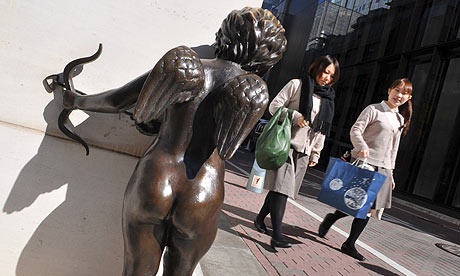Japan's White Day was created to 'compensate' women who bought Valentine's Day presents for men.

Tomorrow Japan and South Korea will celebrate White Day, an annual event when men are expected to buy a gift for the adored women in their lives. On Valentine's Day, women are expected to buy all the important male figures in their lives a token gift: not just their partners, but their bosses or older relatives too. If the present is a romantic one, it is known as honmei-choco (chocolate of love). Surely it's reasonable for men to be indulged on one day of the year, given the number of times they're expected to produce bouquets of flowers on spec and surprise their woman with perfume or pearls?
But the idea of a woman spoiling a man didn't sit easily with people. In 1978, the National Confectionery Industry Association came up with an idea to solve this anomaly. They started to market white chocolate that men could give to women on 14 March, as compensation for the male-oriented Valentine's Day.
The day captured the public imagination, and is now a fully-fledged, nationally recognised date in the diary - and one where men are obliged to whip out their credit cards. In fact, men are now expected to give gifts worth triple the value of those they received.
The temptation for women in Japan must be to buy every man they know some cheap chocolates on Valentine's Day as an investment. For example, the website TopTable looked at British dinner daters and found that 85% of men would sneakily pick up the bill when their date wasn't looking, even if the evening hadn't gone well. It doesn't seem to be just a wooing factor: men also fork out more in established relationships. The price comparison website MoneySupermarket worked out that this Valentine's Day, the average man spent £48 on his lucky lover, compared to the £22 spent by women.
"I'd always offer to pay my way, but I'd actually think it a bit lame if the man didn't get the first meal," says a single 32-year-old advertising executive, who didn't want to give her name for fear of not getting any more free dates.
Alexandra Todd-Nelson, a 38-year-old sales director, agrees that men do tend to buy more material gifts over the course of a relationship. Some argue that women, being the childbearers, by default put more into a relationship emotionally and physically.
I'm not sure that this requires men to forever try to compensate women.